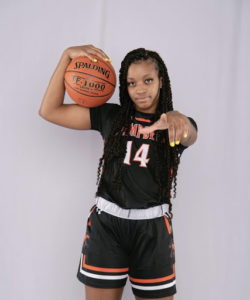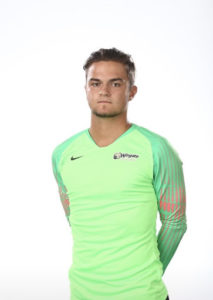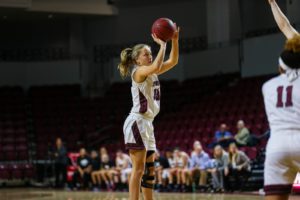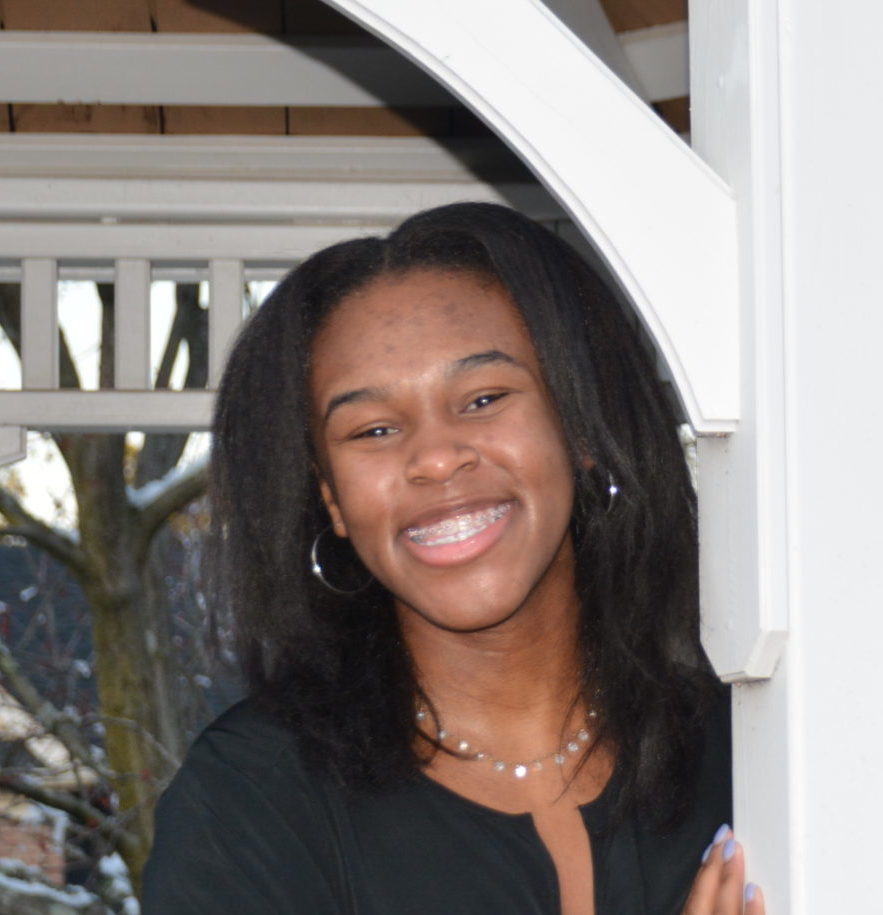Becoming a collegiate athlete takes hard work and determination. Student athletes are required to balance a schoolwork with a rigorous game and practice schedule.
So why play sports at such a high level?
Playing a sport at the collegiate level is a privilege because there are many positive outcomes for the athletes. According to ncaa.org, playing sports in college provides opportunities to learn, compete, and succeed. The athletes receive top-notch academic support, quality medical care, and regular access to outstanding coaching, facilities, and equipment.
Former Leesville student athletes share their experiences playing their sports on a collegiate level.
Rose Sande plays basketball at Roanoke College. She agrees that playing in college not only improved her skills on the court, but she has improved her life skills as well.
“Playing basketball in college will help me with my future career because my future employer will see that I understand the importance of time management, learning from my mistakes, and the importance of being a hard worker,” said Sande via text.
Playing Division I

Division I is the highest division for the NCAA. This division is made up of 350 schools which is about 32% of the NCAA. Division I schools field more than 6,000 athletic teams and more than 170,000 student athletes compete each year.
The D1 division involves an increased rigor in the athlete’s daily schedule along with competitive games within their conferences. As a result, these institutions manage the largest athletic budgets which allows the schools to offer full ride athletic scholarships.
Brittany Staves, former Leesville basketball player, plays at Campbell University which has a very tough conference — The Big South.
Staves wanted to play D1 basketball because athleticism runs in her family and if she challenged herself every day, she knew she would play D1 basketball.
“Playing a D1 sport was my ultimate goal because not everyone can make it to this level,” she said. “I knew it would be a challenge but I was determined. And I did it!”
Staves mentioned how beneficial her full ride scholarship is to her family.
“My favorite part about being a collegiate athlete is the opportunity to be on a full ride scholarship and have my education paid for,” said Staves via text.
Staves is a sophomore at Campbell, and she feels very comfortable around her teammates, creating a family-like environment.
“I also get to make new lifelong friendships with my teammates who are more like sisters,” she said.
Staves wants to become a physical therapist and knows that playing in college gives her a chance to get the first hand experience of what the trainers do. This will help her receive better insight for her career as a physical therapist.
Playing Division II

Division II is the middle ground for the NCAA. This division consists of 310 schools which makes up 28% of the NCAA.
According to ncaa.org, the philosophy of D2 athletics is maintaining a balance between academic success as well as athletic success.
This division is unique because there are institutions located in Canada and Puerto Rico.
Jamie Boegel, a former Leesville soccer player, uses these international connections to his advantage.
Boegel plays soccer at Wingate University where during his first semester he was one of the four Americans on the roster.
“I’ve learned new languages because the Wingate soccer program is known for being mostly international,” said Boegel via text.
Unlike D1 schools, D2 schools offer a half and half system. They can offer half athletic scholarships and put the other half toward academic scholarships or financial aid.
“[Wingate] offered me the best situation soccer wise being one of the best D2 programs in the country,” wrote Boegel. “Most importantly the best situation financially for my family and I.”
Boegel knew right away that he wanted to play soccer in college and once he stepped foot onto Wingate’s campus, he knew he was home.
“My favorite part about being a college athlete is being brought into a family,” adds Boegel. “My first day on campus I felt like I had just met 24 of my long lost blood brothers.”
As Boegel went through his recruiting process, he dreamt of playing at a big D1 school. Later down the road he found Wingate University and has called it his home ever since.
Playing Division III

On the contrary, Division III is the lowest ranking division, but is the largest division in terms of number of institutions and number of participants.
This division has 438 schools which makes up 40% of the NCAA; the majority of the schools are liberal arts colleges. Unlike D1 and D2 sports programs, D3 institutions do not award athletic scholarships. Similar to the athletes playing in a higher division, division III athletes illustrate their passion for the sport and pursuit of an education.
Sande plays D3 basketball at Roanoke College, a liberal arts college. She decided to play D3 because she enjoys the competitiveness that her school brings to every game.
“I chose to play D3 basketball because I love playing the sport and I love the competitiveness,” she said. Another big factor in Sande’s decision to go D3 is the life skills she will pick up during her four years at Roanoke.
“I know I will learn and improve important skills which prepare me for life,” said Sande.
Even though D3 does not award athletic scholarships, Sande was able to receive scholarship money academically. Despite not having major benefits like full-ride athletic scholarships, Sande said she was rewarded with much more beneficial factors which allows her to have the best college experience.
“My favorite part about being a college athlete is that I got best friends for life,” said Sande.
Sande and her teammates go hiking on weekends, study together, do homework, and they share many laughs.
Sande is happy at Roanoke and can’t wait to share three more seasons with the people she has bonded with the most–her teammates.
Advice for Future Athletes
Being a college athlete is difficult, no matter what division they play in. What all three of these athletes have in common is they were willing to put in the work to get to the place that best suited them, not those around them.
Sande, playing D3 basketball, focused more on what Roanoke had to offer before she considered what the basketball program was like. She shares her experience with future athletes.
“Choose a school first for itself before the sport because you need to love the school, the people, and the academics,” said Sande. “You need to find a school that you like and one you will fit into the best.”
Boegel’s piece of advice focuses on staying on task and getting better every day on the soccer field as well as the classroom.
“My advice to any future college athlete is to stay on top of your studies, work your butt off everyday whether that’s in practice or in the classroom,” said Boegel. “Make your priorities straight and don’t let stupid things get in the way of what’s important.”
Staves’ advice focuses more on committing to the sport you play. The recruiting process is long, but she encourages future athletes to remember to balance out their studies as well as their skills on the court.
“Focus equally as hard on your books because coaches recruit STUDENT athletes (in that order)!” said Staves. “You are more likely going to get a scholarship to a school if both your books and skills are up to par.”
Staves knows what it takes to get to the D1 level and what really helped her was challenging herself every day to get better in the classroom and on the court.
“Stay focused on your goal and give 100%. At the end of the day, the only person that can dictate your future is yourself!”

Hi! My name is Kyla, and I am a senior editor for The Mycenaean. I am the secretary for Senior Class Council and also the editor-in-chief for Leesville’s literary magazine

Leave a Reply